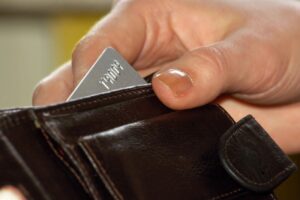
By: Robert J. Nahoum
THE PROBLEM
You got a phone call from what you thought was a representative of your bank and were told that your account was at risk. Concerned, you were convinced to give the caller your username and password. You later learn that the caller was a fraudster not a legitimate bank representative and they emptied the money from your bank account – how do you get your money back?
THE RULES
The Electronic Funds Transfer Act (EFTA) is a federal law that protects consumers from unauthorized electronic transfers. It governs transactions like debit card payments, ATM withdrawals, and online banking transfers.
Under the EFTA, banks must reimburse consumers for losses due to unauthorized transfers—those made without the consumer’s permission. However, the tricky part comes when a scammer uses deception rather than direct hacking to obtain your credentials.
When Fraudsters Trick You Into Sharing Your Password
If you voluntarily provide your login details because you were tricked (through phishing, fake customer service calls, or similar fraud), banks often claim this makes the transfer “authorized.” They argue that because you gave the fraudster access, the EFTA does not apply.
However, the courts increasingly recognize that deception negates authorization. If the transfer was induced by fraud or misrepresentation, it may still count as unauthorized under the law.
Who Is Responsible—You or the Bank?
Banks must investigate any reported unauthorized electronic funds transfer and determine fault within a specific time frame. If you report the loss promptly (within 60 days of your statement being sent), your liability is limited—often capped at $50 or $500, depending on timing and circumstances.
The key is how the fraud occurred:
- EFTA likely applies when a fraudster initiates the transfer after tricking you into giving credentials through deception or impersonation.
- EFTA may not apply if you personally initiated the transaction under false pretenses (for example, sending funds voluntarily as part of a scam).
What You Should Do If You Were Scammed
If you fall victim to this type of fraud:
- Contact your bank immediately to report the unauthorized transfer.
- Follow up in writing within ten business days.
- Preserve all emails, texts, or messages related to the scam.
- File a police report with your local police department.
- Contact a consumer protection attorney to help enforce your rights under the EFTA.
How a Consumer Protection Attorney Can Help
An experienced consumer protection lawyer can challenge a bank’s denial of an unauthorized transfer claim and recover wrongfully withdrawn funds. Many cases under the EFTA also allow recovery of attorney’s fees and damages, making it practical for consumers to pursue justice.
If you need help recovering money lost to a bank account hack, contact us today to see what we can do for you. With offices located in Brooklyn and the Hudson Valey, the Law Offices of Robert J. Nahoum represents consumers in cases throughout the Tristate area including New Jersey.
The Law Offices of Robert J. Nahoum, P.C
(845) 232-0202
www.nahoumlaw.com
info@nahoumlaw.com
